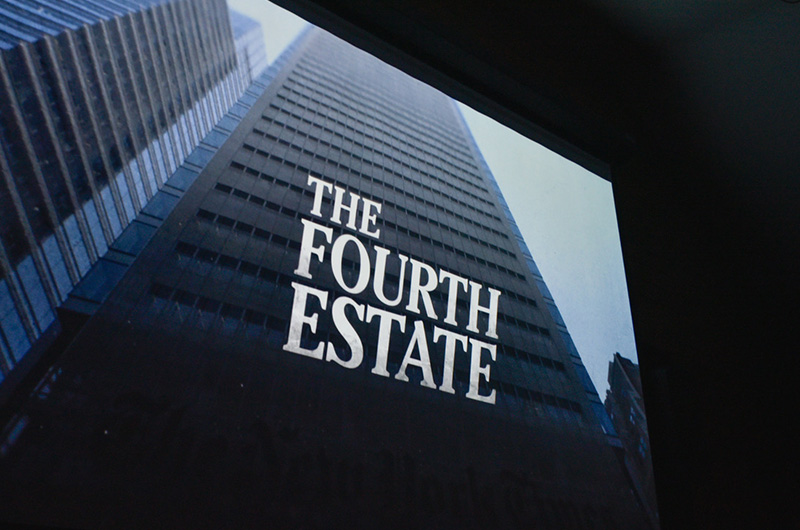On November 8, 2016, one of the most surprising outcomes in political history left many Americans wondering about their country’s future. One of them was documentary filmmaker Liz Garbus.
“After the election,” she said Wednesday night at the Chilmark Community Center, “I was thinking, how could I use my voice in this political landscape? What story could I tell? I soon realized that it was about the press.”
Out of that curiosity emerged the The Fourth Estate, a Showtime documentary that gives an inside view of the New York Times during the first year after President Trump’s election. Ms. Garbus followed journalists at the newspaper for a year, collecting over 600 hours of footage. She edited that down into four episodes each an hour-and-a-half-long for the Showtime series that was televised this past year.
So how did Ms. Garbus flip the script, turning journalists into the subjects they normally cover?

“I just asked,” she told the Chilmark audience on Wednesday, after a screening of the first episode.
Although many New York Times employees, already overburdened by covering the presidential administration, felt initial reluctance about Ms. Garbus’s presence in the newsroom, most eventually warmed to her and film crew.
“Their instinct was toward transparency,” Ms. Garbus said. “It was some collaboration, and it was some throwing darts.”
By the end of the filming, journalists had Ms. Garbus on speed-dial, calling her when stories were about to break so she could film.
Along with the showing, the community center hosted a question-and-answer session between the audience, director Ms. Garbus, and Pulitzer Prize-winning New York Times journalist, Mark Mazzetti. Mr. Mazzetti features heavily in the episode, entitled The First 100 Days. He had the distinct pleasure of watching himself on screen.
“It was great that the community center had that space in the back,” he said after the viewing, “because just watching this, in the first 20 minutes, I was pacing around, my blood pressure was rising.”
The episode shows Mr. Mazzetti’s investigative task force scramble to break a story on Michael Flynn, only to lose out to the Washington Post.
“It’s important to be first,” he said. “But it’s even more important to be right.”
Later in the episode, the four-person reporting team ended up breaking a story about the Trump campaign meeting with senior Russian officials. Watching the episode, it’s clear neither Mr. Mazzetti, nor any of his other colleagues, got a lot of sleep in those first 100 days.
“We were under siege,” he said afterward. “Nothing was like that first year. The intensity was something I’ve never experienced before.”
The episode shows White House correspondent Maggie Haberman leave an interview aired to over two million people because she gets a Facetime call from her children. She has to balance the needs of her family with the needs of a 24-hour news cycle.
“I’m so tired,” she says in the show. “But I don’t know how to stop at this point, either.”
As frantic, hectic and exhausting as their lives are, the journalists depicted in the episode felt their work in the era of “fake news” was more important than ever.
“I’m used to people saying fake news,” Mr. Mazzetti said. “I don’t take it personally. If the President says nice things about what you are doing, then you are probably doing something wrong. I’m sure there’s something out there that would make Trump lose his support, but, my God, I can’t begin to imagine what it is.”
In the first 100 days alone, journalists at the New York Times covered Russia, the Supreme Court nominee, the collapse of the Affordable Health Care Act, the Bill O’Reilly scandal, and Trump’s speech at the Conservative Political Action Conference. The list goes on, with each seemingly groundbreaking story begetting an even crazier one. The episode ends with one word highlighted on the screen: collusion.
“Mueller is going to work on his own timetable,” Mr. Mazzetti said. “I don’t think it’s going to be two years. But it’s not going to be two weeks, either. The big question for the Dems if they win in November is if they move ahead to try to impeach the President. It will be a big story.”




Comments
Comment policy »